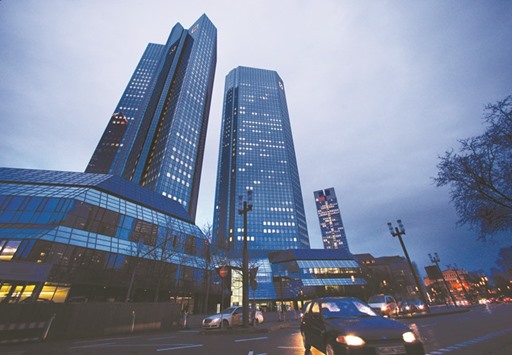Deutsche Bank was dealt a fresh blow on Saturday when an Italian court charged the company, an employee and five former executives for colluding with Banca Monte dei Paschi di Siena to falsify the Italian lender’s accounts in 2008.
Michele Faissola, who oversaw global rates at the time, and Ivor Dunbar, former co-head of global capital markets, were among those indicted in a Milan court.
Both were top deputies to former Deutsche Bank co-chief executive officer Anshu Jain, and both have left the company.
Deutsche Bank has been trying to reassure investors and clients that it can withstand the financial strain of mounting legal bills. A US Department of Justice request last month that the lender pay $14bn to settle a case tied to mortgage-backed securities rattled confidence and drove its shares to record lows. CEO John Cryan had to defend the bank’s resilience after some hedge funds cut back their cash balances.
“This is another ugly picture, and it’s painful even if it’s an old transaction,” Christopher Wheeler, a financial analyst with Atlantic Equities in London, said of the Italian case.
Faissola declined to comment. Dunbar didn’t immediately return a message to his mobile phone.
The charges follow a three-year probe that, according to prosecutors, showed Monte Paschi used the transactions to hide losses, leading to a misrepresentation of its accounts between 2008 and 2012. The deals came to light in January 2013, when Bloomberg News reported that Monte Paschi used derivatives struck with Deutsche Bank to mask losses from an earlier derivative contract dubbed Santorini.
Monte Paschi, the world’s oldest bank, restated its accounts and had to tap shareholders twice to replenish capital amid a surge in bad loans and losses on derivatives. It’s now attempting to convince investors to buy billions of euros of soured debt before another stock sale.
Deutsche Bank’s shares have slumped 49% in Frankfurt this year, and swung wildly last week. Monte Paschi has dropped 84% this year on concern it will struggle to restore profitability and strengthen its finances.
The Deutsche Bank managers were indicted along with former executives at Nomura Holdings, who struck a similar deal with the Italian bank, and at Monte Paschi.
The international firms are also named as defendants in the indictment, as Italian law makes companies liable for certain crimes committed by their representatives. A trial is scheduled for December 15.
“We will put forward our defence in court and have no further comment to make today,” Deutsche Bank said in an e-mail.
“I’m convinced that the debate will definitely show that Nomura has no responsibility over Monte Paschi’s false accounting,” said Guido Alleva, a lawyer for Nomura. A spokeswoman for the Japanese bank and a Paschi spokesman declined to comment.
Monte Paschi’s former executives Giuseppe Mussari, Antonio Vigni and Gianluca Baldassarri, and former Nomura bankers Sadeq Sayeed and Raffaele Ricci also will face trial on charges of obstructing regulators after the investigation revealed that the 2009 deal, dubbed Alexandria, was designed to disguise losses from a previous investment.
Monte Paschi asked for a plea-bargain agreement in July. The lender said at that time that the request was agreed to with prosecutors in the Milan investigation, and if accepted by the judge the bank will need to forfeit €10mn ($11.2mn) and pay a fine of €600,000. A decision is expected on October 14.
Former Deutsche Bank executives Dario Schiraldi and Marco Veroni and current employee Matteo Vaghi, as well as Monte Paschi’s Daniele Pirondini and Marco Di Santo, will go to trial. Former Deutsche Bank manager Michele Foresti, who oversaw rates and European credit flow trading, also was indicted.
Deutsche Bank employs about 3,900 employees in Italy, making it the company’s fifth-largest market by staff, its annual report shows. Italy is a key consumer and corporate market for Deutsche Bank, which generated net revenue of €1.05bn in the country last year.
The US Justice Department is seeking a settlement over allegations that the bank misled investors about the quality of subprime mortgage bonds it created and sold during the housing boom that led to the 2008 crisis. Deutsche Bank faces inquiries into additional legal issues, including precious metals trading and billions of dollars in transfers out of Russia.
“When it rains, it pours,” said Marco Elser, a partner at Lonsin Capital, a London-based asset-management firm. “They have their hand caught in every single cookie jar. I think the market is seeing a wounded lion and will soon prey on it.”

Lights illuminate the windows of Deutsche Bank headquarters at night in Frankfurt. Deutsche Bank’s Michele Faissola, who oversaw global rates at the time, and Ivor Dunbar, former co-head of global capital markets, were among those indicted in a Milan court for colluding with Banca Monte dei Paschi di Siena to falsify the Italian lender’s accounts in 2008.
